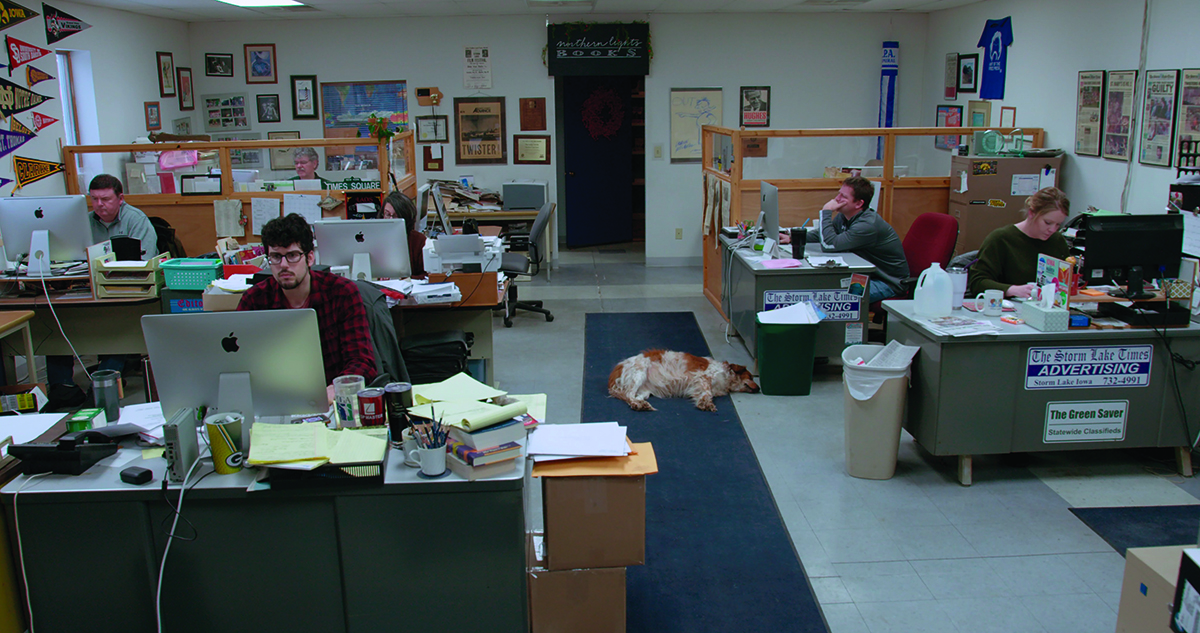HIFF Review: 'Storm Lake'

The final day of the Hamptons International Film Festival, Wednesday, October 13, will feature Storm Lake, a remarkable documentary about the decline of a small town biweekly newspaper in the Iowa Rust Belt that continues as its owners try to figure out what to do about it. Weekly newspapers all around the country are dying. Is this Iowa paper going to be next?
Their Storm Lake Times, founded in 1990, is a family affair. John Cullen is the publisher, his brother Art Cullen is the editor, Art’s son Tom is the reporter and Art’s wife Dolores is the photographer and feature writer. Much of the movie’s drama takes place in the city room, where Art’s dog Peaches is often under foot.
The paper is also special. In 2017, Art Cullen won a Pulitzer Prize for his revealing story about local officials and Storm Lake’s biggest employer, a huge Tyson Foods meatpacking plant. Indeed, this Pulitzer, awarded for the way the paper took on the state’s biggest agricultural players and said their donations should be made public, is probably what attracted the documentarians Jerry Risius and Beth Levison to make this documentary.
The film is very well done, marking a year from October 2019 to September 2020 in this Iowa small town where the newspaper editors cover half a dozen Democratic candidates such as Pete Buttigieg and Elizabeth Warren. On the campaign trail, the candidates meet with disgruntled farmers being bought out by Big Ag and an ever-increasing number of Hispanic immigrants who have moved to town to work for Tyson. The editors also cover small-town events such as parades, picnics and local high school plays. They love their hometown of Storm Lake, population 11,000 and believe others do too.
Traditional journalism, the kind that searches for truth, for the right thing to do, for people getting their names in the paper for doing good, is the order of the day. There are births, weddings, deaths and on the op-ed page, opinions. These are the touchstones of the Storm Lake Times.
How this is supposed to work in a community where the farmers are suffering because of Tyson, where the mom and pop stores that used to advertise have shut down because of the chain stores, where huge divides exist between big business and the rights of the workers, and where a worldwide cultural shift from the old-fashioned truth told in print to the hate, fake news, and lies that abound on the internet, makes watching this documentary both shocking and sad.
The two brothers, the editor and the publisher, meet for breakfast at a nearby coffee shop to discuss the disappearing bottom line. Both are now working without pay, living on Social Security. They are charming, confused and convinced that the profession of journalism cannot fail, that the townspeople will awaken again to that fact and the circulation will come back. They just don’t see what is right in front of them.
“Maybe we should do something with the internet,” publisher John Cullen says.
“If I wanted to get into that, I’d go into radio,” Art Cullen replies.
They fail to see how desperation is taking hold in much of America because of the shift to big business and unregulated social media. All regular citizens have left is COVID and some despicable crap to chew on. They no longer care about Storm Lake. This film looks at this right in the eye.
We root for the Cullens and for the truths of journalism. But it seems like they are Don Quixote and Sancho Panza tilting at windmills. There must be a way out. But what? They just don’t know.
And therein lies the power of this documentary.



